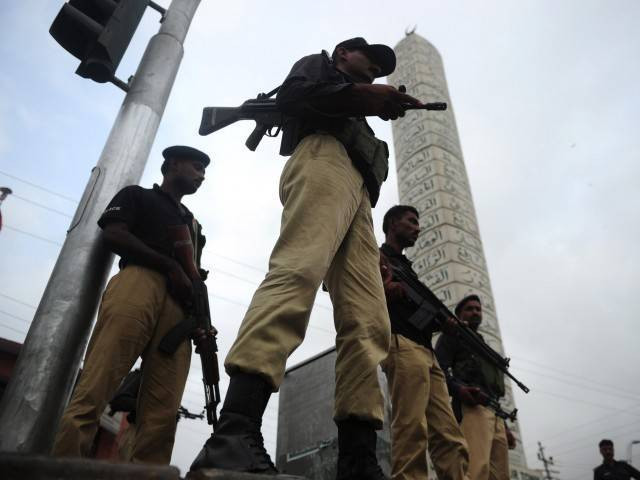SC calls for common seniority across police force
Gives Sindh govt three months to make common seniority list

A file photo of Karachi police. PHOTO: AFP
The apex court, therefore, directed the Sindh government to prepare the common seniority list of police personnel serving in different establishments within three months in terms of the Police Rules, 1934. It also directed the government and other competent authorities to submit a compliance report within the stipulated time.
These directives were contained in a 43-page judgment issued on Friday after a three-member larger bench, headed by Chief Justice Anwar Zaheer Jamali, heard different appeals regarding the judgment of the Sindh Service Tribunal in a case relating to seniority of inspectors working in the Sindh Reserve Police (SRP) and regular police.
The issue had cropped up on June 30, 2010 when then IG had issued a standing order declaring the training branch establishment a Range and the DIG training branch was “unauthorisedly” conferred administrative powers of the Range DIG.
The DIG also started recruiting police constables and maintaining their own seniority against the police rules.
The judges noted that the standing order was admittedly issued without the approval of the government, which is a mandatory requirement, adding that such an order is beyond the authority of the IG as the rules do not confer upon him powers to alter the terms and conditions of any establishment within the police force.
The bench remarked that the situation further aggravated when then SRP DIG usurped the administrative powers of the Range DIG unilaterally and started recruiting personnel, which was beyond his authority.
Likewise, Special Branch DIG also recruited personnel and maintained their seniority.
The apex court observed that “in other words the very Standing Order of 30.6.2010 declaring training branch establishment as a Range ex-facie was in violation of Section 2 of the Police Act, 1861 read with Rule 1.5 of the Police Rules, 1934, whereas the administrative powers unilaterally exercised by the DIG, Sindh Reserve Police establishment and Special Branch establishment were against the spirit of the Police Act and Rules.”
It observed that Section 12 of the Police Act, 1861 leaves no doubt or ambiguity as to the fact that the police force is an indivisible entity that is commanded by the IG, and he can frame orders or rules with regard to the organisation, classification and distribution of the police force.
“Likewise, we are clear in our mind that all the establishments, other than the executive police establishment, i.e. in-charge district police and Range DIG, are barred from making direct or indirect recruitments or promotions,” reads the judgment.
The bench wrote: “We are disturbed in the manner the powers were being exercised by the DIGs heading different establishments under the nose of the government, which was not only against the police rules, but such practice has actually divided the police force.”
They observed that there is no concept of cadre within the police, which is one indivisible force.
Allowing the appeals, the SC set aside the service tribunal’s judgment.
It wrote in the order: “It is expected from the Sindh government and the IG that the directives contained in this judgment shall be implemented in its letter and spirit without any undue delay and the seniority list of all the police personnel belonging to any of the establishment created in terms of Rule 1.4 of the Police Rules, 1934 shall be prepared within the time stipulated in the judgment.”
Published in The Express Tribune, May 7th, 2016.



















COMMENTS
Comments are moderated and generally will be posted if they are on-topic and not abusive.
For more information, please see our Comments FAQ